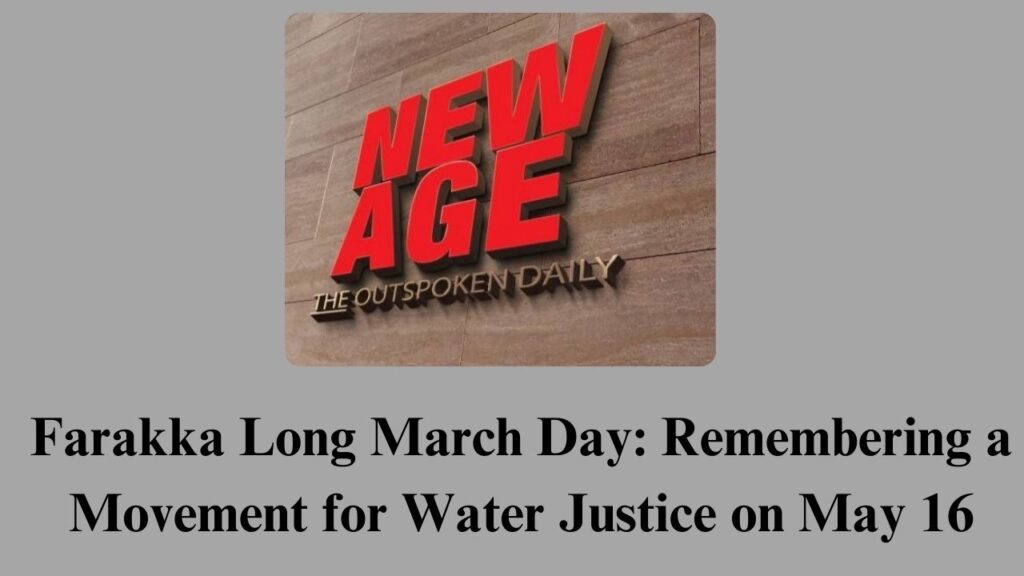Farakka Long March Day: Remembering a Movement for Water Justice on May 16
Farakka Long March Day: Remembering a Movement for Water Justice on May 16: Every year on May 16, Bangladesh commemorates Farakka Long March Day, a significant moment in the country’s environmental and political history. This day marks the anniversary of the historic 1976 Long March led by the late Maulana Abdul Hamid Khan Bhashani, a towering figure in the nation’s political landscape. The event was a bold protest against India’s construction of the Farakka Barrage, which had a detrimental impact on the flow of the Ganges River into Bangladesh.
The Farakka Long March was more than a protest it was a call for environmental justice, national sovereignty, and regional cooperation over shared water resources. Decades later, the issues surrounding the Farakka Barrage remain deeply relevant, with water security and transboundary river management still major concerns in South Asia.
The Historical Background
The Farakka Barrage, located in the Indian state of West Bengal, was built by India in the early 1970s with the aim of diverting water from the Ganges River to revive the Bhagirathi-Hooghly River and support the Kolkata port. However, the diversion of water severely reduced the flow of the Ganges downstream into Bangladesh, leading to ecological degradation, loss of agricultural productivity, and increased salinity in many areas of the country’s southwest.
In response, Maulana Bhashani organized the Long March to Farakka on May 16, 1976, which drew thousands of supporters from all over Bangladesh. Despite his old age and poor health, Bhashani led the march with unwavering resolve, capturing the attention of both national and international audiences. The protest was peaceful but powerful, and it brought the Farakka issue into the global spotlight.
Why May 16 Still Matters
Farakka Long March Day is not just a historical commemoration it is a reminder of the ongoing struggle for equitable water sharing and environmental justice in South Asia. Bangladesh, being a lower riparian country, depends on the fair and consistent flow of water from rivers that originate upstream in India, including the Ganges, Teesta, and Brahmaputra.
The impact of the Farakka Barrage has been studied extensively. Reduced water flow has led to desertification, reduced fish populations, increased riverbed siltation, and serious challenges for farming communities in the Ganges-dependent regions of Bangladesh. Many experts argue that the long-term effects have not only been environmental but also economic and social, affecting the livelihoods of millions.
Commemorating May 16 each year serves to renew public awareness and governmental focus on finding sustainable, cooperative solutions for transboundary water management. It also honors the legacy of Bhashani and all who marched with him, emphasizing the value of peaceful protest and people’s movements in shaping national policy.
The Legacy of Maulana Bhashani
Maulana Abdul Hamid Khan Bhashani was known as the “Red Maulana” due to his socialist ideals and fierce advocacy for the poor and oppressed. His leadership of the Farakka Long March was one of his final acts of defiance against injustice, but it remains one of his most iconic.
Bhashani’s vision extended beyond borders—he understood the importance of regional cooperation and peaceful negotiations in addressing shared challenges. His ability to mobilize thousands of people around a complex environmental issue, long before terms like “climate justice” or “eco-politics” were mainstream, is a testament to his foresight and leadership.
His message still resonates today: water is a shared resource, and its equitable distribution is essential for peace, development, and sustainability.
Contemporary Relevance and the Path Forward
As climate change accelerates and water scarcity becomes an even more pressing concern, the lessons of Farakka Long March Day are increasingly relevant. Bangladesh continues to face seasonal droughts, erratic monsoon patterns, and reduced freshwater availability problems exacerbated by upstream river management practices.
The Ganges Water Sharing Treaty, signed between Bangladesh and India in 1996, was a step forward, but many argue it falls short of addressing year-round water flow needs and lacks strong enforcement mechanisms. Additionally, issues over the Teesta River remain unresolved, despite years of negotiations and diplomatic efforts.
Environmental activists and water experts in Bangladesh frequently call for a comprehensive regional water-sharing framework, involving not just bilateral talks but also multilateral cooperation among all countries in the Ganges-Brahmaputra-Meghna basin. They also advocate for scientific water flow monitoring, river restoration projects, and greater public participation in water governance.
Observances and Events
Each year on May 16, political parties, environmental groups, and civil society organizations in Bangladesh organize rallies, seminars, and public discussions to mark Farakka Long March Day. These events often call for the full implementation of water-sharing agreements and urge greater accountability in transboundary river negotiations.
Educational institutions also observe the day by conducting essay competitions, debates, and exhibitions to inform younger generations about the historical and ongoing importance of the issue. Media outlets typically publish op-eds and feature stories reflecting on the significance of Bhashani’s leadership and the continuing challenges around water justice.
Conclusion
Farakka Long March Day stands as a powerful symbol of resistance, solidarity, and hope. It reminds us that when people’s voices unite for a just cause, they can influence policy, raise awareness, and drive change—even on issues as complex as international river water distribution.
As Bangladesh observes Farakka Long March Day on May 16, it does so not only to honor the past but also to renew its commitment to a fair and sustainable water future for all.




